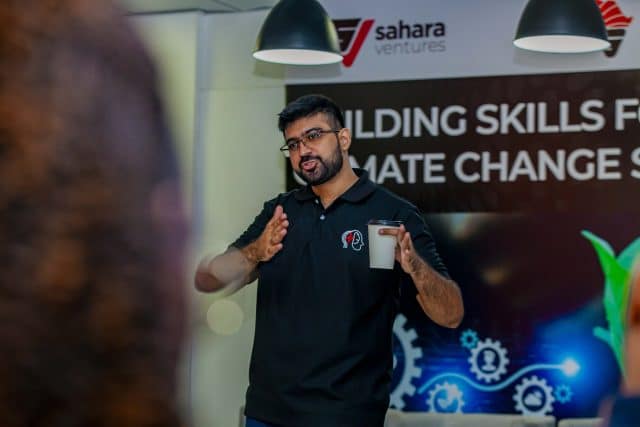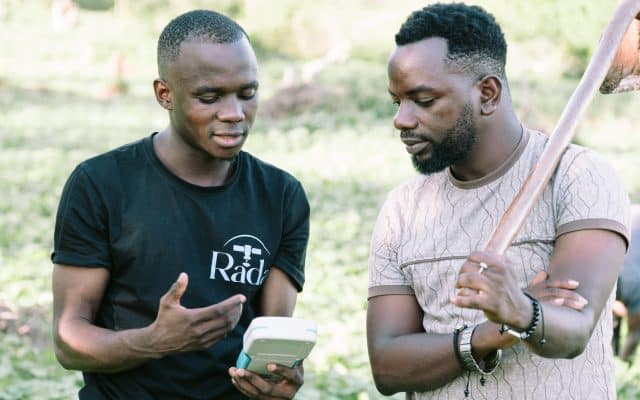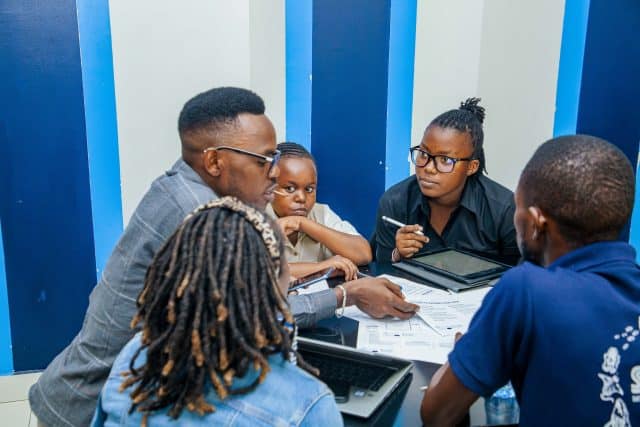Smarter skies: How Tanzanian innovators are using AI for climate action

To understand how AI can play a role in bridging critical data gaps and empowering climate resilience in Tanzania, we spoke with farmers, AI innovators, and community leaders involved in our Adaptation Innovation Cluster.
William Karatibu is a lifelong bean and maize farmer. Like many in his region, he grew up learning to read the land. His parents taught him how to interpret ant patterns, cloud movements, and the feel of the wind to predict rain. But Tanzania’s climate is changing, and weather patterns have become erratic. Heatwaves scorch the earth, followed by unexpected floods. Rains either arrive late, or not at all.
“I’ve been doing exactly what my parents taught me – following their methods just like they showed me. But recently, it became more difficult because the traditional ways of observation are less valuable with the current conditions. The methods my parents taught me are not working anymore” says Karatibu. The signs he once trusted stopped working, his crops failed, his income dropped and food became uncertain.
This is not a unique story. Across Tanzania, the impacts of climate change are intensifying. Over the past two decades, average annual rainfall across the country has declined, while extreme weather events (such as heavy downpours, heatwaves and extended droughts) have become more frequent and severe. The Tanzania Meteorological Agency (TMA) reported that the mean monthly rainfall between 2012 and 2016 was 78.8 millimetres, compared to 83.3 millimetres between 1981 and 2010 – a decrease of approximately 5%.
Smallholder farmers face climate uncertainty – and a data gap
According to Tanzania’s 2022 population and housing census, approximately 65.1% of the population lives in rural areas. A survey from the Tanzanian Investment and Consultant Group research centre shows that agriculture contributed 25.3% of Tanzania’s GDP in 2023, and in 2022, the sector engaged 65% of the workforce. More than 70% of local farmers operate on a smallholder basis and families who rely on agriculture face increasingly unpredictable weather. One of the major barriers they face is the lack of access to reliable data, particularly weather data. This is where AI innovation comes into play.
One of the fundamental benefits of artificial intelligence is the power it has to help people make informed decisions. In a rapidly changing and unpredictable environment, data-informed choices can help farmers optimise their harvests and sustain their livelihoods more effectively.
Essa Mohamedali is a Tanzanian AI strategist, community builder, and start-up mentor dedicated to shaping inclusive, responsible, and locally grounded AI ecosystems across Africa. As a co-founder of the Tanzania AI Community, Mohamedali has supported the development of national AI strategies and contributed to policy frameworks.
“One key insight is that AI in Africa is being driven by grassroots communities – passionate individuals, recent graduates, and first-time founders,” he says. Mohamedali also stresses the importance of improved access to data: “Tanzania has made great strides in connectivity, with internet coverage at 72% and more citizens coming online through mobile phones. Regarding data infrastructure, the data exists but is scattered and siloed.”

Essa Mohamedali facilitating Climate KIC’s AI and climate workshop at Sahara Sparks in September 2024
From crop failure to precision farming
While Karatibu’s challenges aren’t unique, what is unusual is how he responded. One evening, while searching online for solutions, he came across an ad for Rada360: a precision agriculture company and one of the Adaptation & Resilience ClimAccelerator winners. The platform leverages satellite earth observation data and AI analytics to help smallholder farmers with real-time crop monitoring in Tanzania adapt to climate risks.
“I was experiencing so much loss that I tried to look for a solution. I went online and found out about Rada360 and understood that they were doing precision farming. To me ‘precision’ means high accuracy,” he says. With Rada360’s hyperlocal weather forecasts, Karatibu changed how he farmed and saw results from one season to the next. “With Rada360,” he says, “I’ve never counted any loss. Because through their technology I now know my soil status and nutrition. I now know when I should plant.”
Now, neighbouring farmers ask him how he gets his plants so shiny and green. His income increased, and his family has more food security. Stories like Karatibu’s offer a glimpse of what is possible: when local knowledge is paired with targeted innovation, communities can adapt, thrive, and address the dual urgency of climate change and information gaps.

Eric Mwandu, Rada360 agronomist, and William Karatibu conducting soil nutritional analysis to optimise agricultural productivity
Rada360 offers a timely response to Tanzania’s urgent challenges. By delivering hyperlocal climate forecasts and tailored agricultural advice directly to farmers’ mobile phones, the start-up enables smallholder farmers to make strategic decisions – from when to plant and how to fertilise, to how to prepare for floods or drought. The platform leverages AI analytics to process satellite imagery and Earth observation data, transforming previously inaccessible information into actionable insights. This AI-powered approach allows Rada360 to monitor crop health, identify crop water stress, pest and disease infestations and generate precise fertiliser recommendations – bridging the information divide that has traditionally left farmers vulnerable to climate uncertainty. The platform’s localised weather forecasting supports farmers in planning field operations throughout the entire cropping season, while yield prediction tools assist both farmers and authorities in assessing food security and post-harvest logistics.
Rada360 is one of four winning ventures of the second Adaptation & Resilience ClimAccelerator, run in collaboration with SmartLab: a Climate KIC programme designed to catalyse local innovation for climate adaptation in Tanzania. Each of the ClimAccelerator winners received grants and support to test their solutions in local communities. Their innovations demonstrate how AI can be both accessible and transformative when developed locally, with solutions ranging from climate-smart agriculture and resilient seeds to circular economy insect protein.
The climate cost of climate tech
Despite the benefits, in any conversation about AI and sustainability, the elephant among the crops is the paradox of using AI to mitigate and adapt to climate change. Behind the scenes, AI runs on systems that are anything but sustainable. Training massive models like GPT-4 burns through vast amounts of energy and strains power grids. Cooling the data centres that keep these models running can require thousands, even millions, of litres of water per day. Building the hardware adds further environmental costs through mining, manufacturing, and transport.
And what’s even more worrying is tech giants are teaming up with oil companies to make fossil fuel extraction faster and more profitable. Far from being a clean break from the past, this is business-as-usual in a shiny new package.
If we’re serious about using AI to fight climate change, we have to ask: who really benefits? And at what cost? Mohamedali says to break the pattern, ethics need to be “baked into all AI training – technical and non-technical – along with more time to ponder and explore the philosophical side of the questions, time to ponder on what the outcome of an unethical solution looks like.”

Workshop participants working in teams on AI and climate assignments at Sahara Sparks, Dar es Salaam, September 2025.
AI literacy as climate resilience
That’s why local, people-first projects matter so much. The Training Programme for AI-Driven Climate Change Solutions (launched by Climate KIC and Omdena, an AI consultancy and AI Product Development platform) is one such example. The six-month programme aimed to train Tanzanians in using AI tools to tackle climate problems in their own communities. It’s about giving people the skills to lead from where they are.
But no one can do it alone. Policymakers, companies, researchers, communities, and global partners all need to work together. AI is, and always has been, about people. In Tanzania, Mohamedali says that building AI literacy builds familiarity, and as familiarity grows, he’s seen adoptees with “a lot more wonder in their eyes and thoughts for what more could it do?”
Local innovators, global impact
Climate KIC is nurturing an innovation ecosystem through an Adaptation Innovation Cluster that supports resilience and helps people in rural areas prepare for, cope with, and recover from climate-related impacts. The goal is not only to respond to Tanzania’s specific climate challenges, but also to spark sustainable development. By supporting local innovation, investing in new green start-ups, and helping communities understand their vulnerabilities, the cluster aims to boost resilience, create jobs, and catalyse long-term change.
With the right support, these technologies could go far beyond Tanzania. They could shape how the world thinks about responsible tech: where it comes from, who builds it, and who it’s for. But that only happens if we start investing differently – supporting models that centre grassroots communities as architects of innovation.

Eric Mwandu and William Karatibu conclude their successful collaboration with a handshake
—
Climate KIC, along with its partner SmartLab is nurturing an Adaptation Innovation Cluster in Tanzania funded by Irish Aid. These clusters take a place-based approach to solving agricultural challenges while unlocking economic opportunities. This article is part of a series highlighting our learnings on adaptation and climate innovation in various regions of Tanzania. Quotes in this article have been edited for clarity.
Climate KIC works with communities, regions, and partners to build climate-resilient societies and tackle the root causes of climate breakdown. Through systemic innovation and collaboration, we support local solutions that enhance the resilience of people, ecosystems and economies to the growing impacts of climate change. Our #AdaptationInAction series highlights stories from our global adaptation portfolio, real examples of resilience in action. This is one of them.
Subscribe to our newsletter and follow us on LinkedIn to stay up to date with Climate KIC’s adaptation initiatives.
